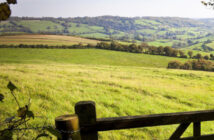The Government has unveiled two new environmental land management schemes, marking the next stages of its plan to reward farmers and landowners for actions which benefit the environment, and support sustainable food production alongside nature recovery and work towards net zero.
The schemes are intended to play an essential role in halting the decline in species by 2030, by bringing up to 60% of England’s agricultural soil under sustainable management by 2030, and restoring up to 300,000 hectares of wildlife habitat by 2042.
The Local Nature Recovery scheme will pay farmers for locally-targeted actions which make space for nature in the farmed landscape and countryside such as creating wildlife habitat, planting trees or restoring peat and wetland areas.
The Landscape Recovery scheme will support more radical changes to land-use change and habitat restoration such as establishing new nature reserves, restoring floodplains, or creating woodland and wetlands.
Alongside the Sustainable Farming Incentive which supports sustainable farming practices, these Government incentives are geared towards providing farmers and land owners with a range of voluntary options from which they can choose the best for their business.
Environment Secretary George Eustice announced that applications will shortly open for the first wave of Landscape Recovery projects.
Up to 15 projects will be selected in this first wave, focusing on two themes – recovering England’s threatened native species and restoring England’s rivers and streams.
These pilot projects are expected to deliver significant environmental benefits including: The creation of 10,000 hectares of restored wildlife habitat; Carbon savings between 25 to 50 kilotonnes per year; and improved status of around half (45-57%) of the most threatened species in England.
“We want to see profitable farming businesses producing nutritious food, underpinning a growing rural economy, where nature is recovering and people have better access to it,” said Mr Eustice.
“Through our new schemes, we are going to work with farmers and land managers to halt the decline in species, reduce our greenhouse gas emissions, increase woodland, improve water and air quality and create more space for nature.
“We are building these schemes together, and we are already working with over 3,000 farmers across the sector to test and trial our future approach. Farmers will be able to choose which scheme or combination of schemes works best for their business, and we will support them to do so.”
Tony Juniper, chair of Natural England, said the schemes mark an historic shift in the way we English land is managed, setting the country on course toward the production of sustainable food and halting and reversing the decline of Nature.
He added: “More than two thirds of England is farmed and these reforms pave the way for those who manage the land to produce healthy food alongside other vital benefits, such as carbon storage, clean water, reduced flood risk, thriving wildlife and beautiful landscapes for everyone to enjoy.
“At Natural England we look forward to working with the government to breathe life into England’s Nature Recovery Network, including through the very exciting ambition to create large scale Landscape Recovery Areas.”




